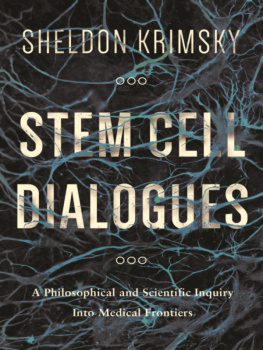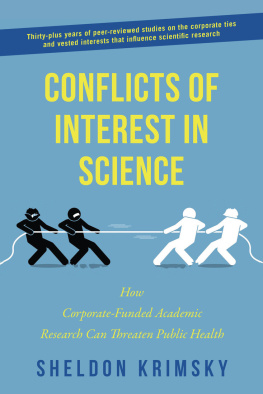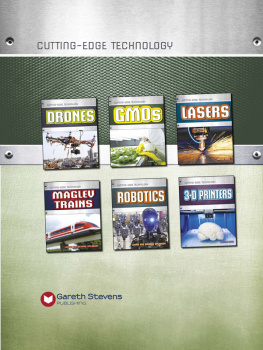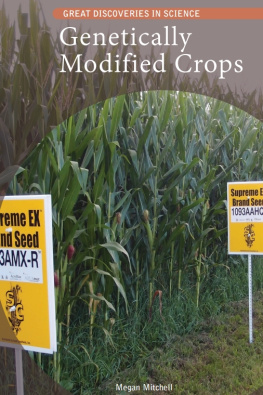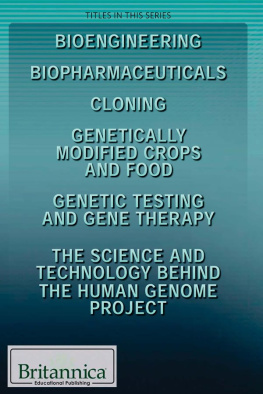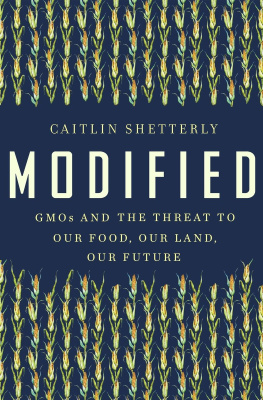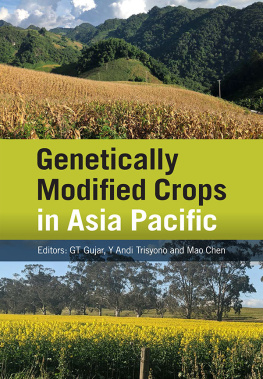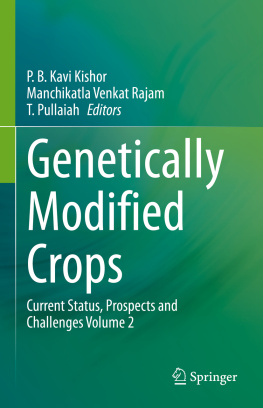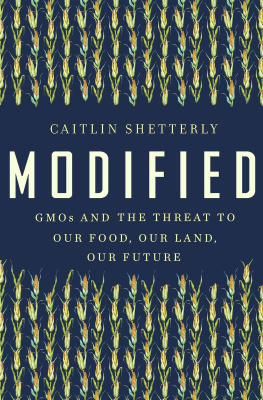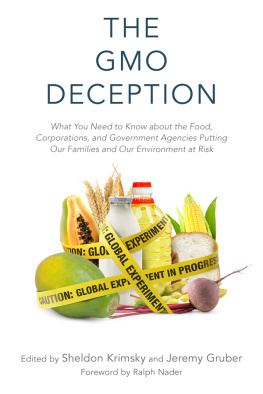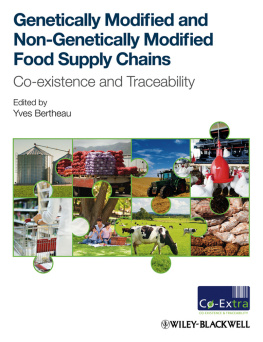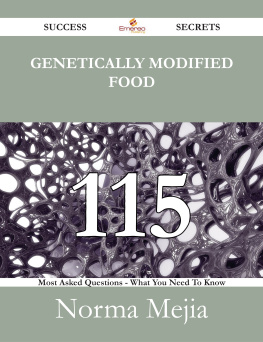Krimsky - GMOs decoded : a skeptic’s view of genetically modified foods
Here you can read online Krimsky - GMOs decoded : a skeptic’s view of genetically modified foods full text of the book (entire story) in english for free. Download pdf and epub, get meaning, cover and reviews about this ebook. year: 2019, genre: Politics. Description of the work, (preface) as well as reviews are available. Best literature library LitArk.com created for fans of good reading and offers a wide selection of genres:
Romance novel
Science fiction
Adventure
Detective
Science
History
Home and family
Prose
Art
Politics
Computer
Non-fiction
Religion
Business
Children
Humor
Choose a favorite category and find really read worthwhile books. Enjoy immersion in the world of imagination, feel the emotions of the characters or learn something new for yourself, make an fascinating discovery.

GMOs decoded : a skeptic’s view of genetically modified foods: summary, description and annotation
We offer to read an annotation, description, summary or preface (depends on what the author of the book "GMOs decoded : a skeptic’s view of genetically modified foods" wrote himself). If you haven't found the necessary information about the book — write in the comments, we will try to find it.
Krimsky: author's other books
Who wrote GMOs decoded : a skeptic’s view of genetically modified foods? Find out the surname, the name of the author of the book and a list of all author's works by series.
GMOs decoded : a skeptic’s view of genetically modified foods — read online for free the complete book (whole text) full work
Below is the text of the book, divided by pages. System saving the place of the last page read, allows you to conveniently read the book "GMOs decoded : a skeptic’s view of genetically modified foods" online for free, without having to search again every time where you left off. Put a bookmark, and you can go to the page where you finished reading at any time.
Font size:
Interval:
Bookmark:
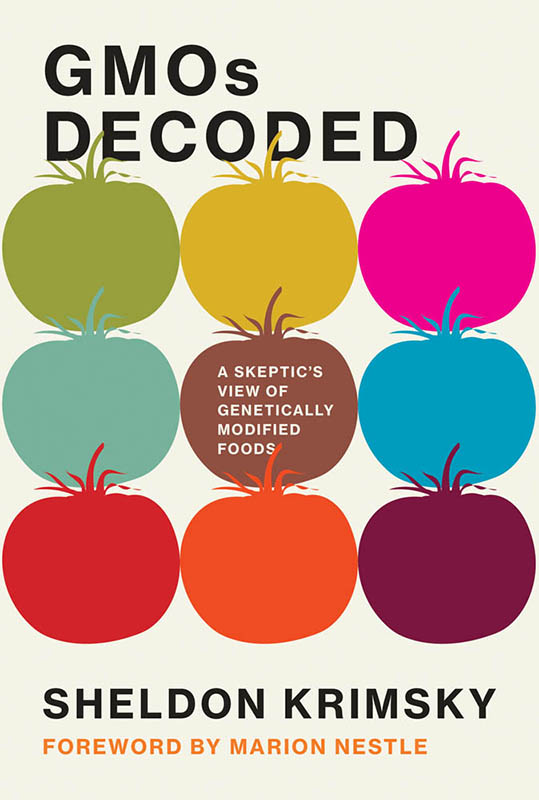
Food, Health, and the Environment
Series Editor: Robert Gottlieb, Henry R. Luce Professor of Urban and Environmental Policy, Occidental College
Keith Douglass Warner, Agroecology in Action: Extending Alternative Agriculture through Social Networks
Christopher M. Bacon, V. Ernesto Mndez, Stephen R. Gliessman, David Goodman, and Jonathan A. Fox, eds., Confronting the Coffee Crisis: Fair Trade, Sustainable Livelihoods and Ecosystems in Mexico and Central America
Thomas A. Lyson, G. W. Stevenson, and Rick Welsh, eds., Food and the Mid-Level Farm: Renewing an Agriculture of the Middle
Jennifer Clapp and Doris Fuchs, eds., Corporate Power in Global Agrifood Governance
Robert Gottlieb and Anupama Joshi, Food Justice
Jill Lindsey Harrison, Pesticide Drift and the Pursuit of Environmental Justice
Alison Alkon and Julian Agyeman, eds., Cultivating Food Justice: Race, Class, and Sustainability
Abby Kinchy, Seeds, Science, and Struggle: The Global Politics of Transgenic Crops
Vaclav Smil and Kazuhiko Kobayashi, Japan's Dietary Transition and Its Impacts
Sally K. Fairfax, Louise Nelson Dyble, Greig Tor Guthey, Lauren Gwin, Monica Moore, and Jennifer Sokolove, California Cuisine and Just Food
Brian K. Obach, Organic Struggle: The Movement for Sustainable Agriculture in the U.S.
Andrew Fisher, Big Hunger: The Unholy Alliance between Corporate America and Anti-Hunger Groups
Julian Agyeman, Caitlin Matthews, and Hannah Sobel, eds., Food Trucks, Cultural Identity, and Social Justice: From Loncheras to Lobsta Love
Sheldon Krimsky, GMOs Decoded: A Skeptics View of Genetically Modified Foods
GMOs Decoded
A Skeptics View of Genetically Modified Foods
Sheldon Krimsky
The MIT Press
Cambridge, Massachusetts
London, England
2019 Massachusetts Institute of Technology
All rights reserved. No part of this book may be reproduced in any form by any electronic or mechanical means (including photocopying, recording, or information storage and retrieval) without permission in writing from the publisher.
This book was set in Stone Serif by Westchester Publishing Services. Printed and bound in the United States of America.
Library of Congress Cataloging-in-Publication Data
Names: Krimsky, Sheldon, author.
Title: GMOs decoded : a skeptics view of genetically modified foods / Sheldon Krimsky.
Description: Cambridge, MA : The MIT Press, [2019] | Series: Food, health, and the environment | Includes bibliographical references and index.
Identifiers: LCCN 2018016803 | ISBN 9780262039192 (hardcover : alk. paper)
Subjects: LCSH: Transgenic plants. | Crops--Genetic engineering. | Genetically modified foods.
Classification: LCC SB123.57 .K75 2019 | DDC 631.5/233--dc23
LC record available at https://lccn.loc.gov/2018016803
Contents
List of Figures
A taxonomy of living organisms
After a gene has been isolated and cloned (amplified in a bacterial vector), it must undergo several modifications before it can be effectively inserted into a plant. This simplified representation of a constructed transgene cassette contains the necessary components for successful integration and expression. The marker gene also has its own promoter and terminator.
A canonical description of DNA transcription and translation in cells.
Global increases in glyphosate-resistant weeds.
Power analysis and biological significance
List of Table
Herbicide-resistant genetically engineered crops approved for sale in the United States, 1994 to 2006
List of Box
The Regulatory History of StarLink Corn, 1996 to 2001
Series Foreword
GMOs Decoded: A Skeptics View of Genetically Modified Foods is the fourteenth book in the Food, Health, and the Environment series. The series explores the global and local dimensions of food systems and the issues of access, community well-being, and social, environmental, and food justice. Books in the series focus on how and where food is grown, manufactured, distributed, sold, and consumed. They address questions of power and control, social movements and organizing strategies, and the health, environmental, social, and economic factors embedded in food-system choices and outcomes. As this book demonstrates, the focus is not only on food security and well-being but also on economic, political, and cultural factors and regional, state, national, and international policy decisions. The Food, Health, and the Environment books therefore provide a window into the public debates, alternative and existing discourses, and multidisciplinary perspectives that have made food systems and their connections to health and the environment critically important subjects of study and for social and policy change.
Robert Gottlieb, Occidental College
Series Editor (gottlieb@oxy.edu).
Foreword
Marion Nestle
GMOs Decoded is a gift to anyone confused about genetically modified foods. In this latest addition to Sheldon Krimskys prolific output of books about how societies interact with new technologies, he takes on a formidable challengeto examine the science of GMOs as a basis for dealing with the ferocious politics they incite. I use the word ferocious advisedly. Positions about GMOs appear polarized to the point of outright hostility. Krimsky wants dtente. If we understood the science better, we might be able to achieve more nuanced views of the risks and benefits of GMOs and of the genetic techniques used to create them.
To anyone familiar with Krimskys previous and ongoing work, this book may come as a surprise. Trained in physics and philosophy, Krimsky is a sharp critic of the role of technology in society with particular interests in the ethical implications of genetics and biotechnology and in risk communication. I have long admired his work for its firm grounding in science and its clear delineation of the ways in which political, cultural, and other societal factors color perceptions of the safety and other risks of new technologies.
In GMOs Decoded, Krimsky takes a deep dive into the science of food biotechnology on its own, separate from issues related to how the science is used by the companies producing and profiting from GMOs, or is interpreted by proponents, critics, or the general public. An attempt to discuss the science of GMOs distinct from its politics may appear foolhardy, if not impossible, and Krimsky deserves much praise for taking this on.
I speak from experience. My book about food biotechnology, Safe Food, first published in 2003, began with a reference to C. P. Snows two-culture problemwhat Snow called the gulf of incomprehension between scientists and nonscientists over matters of technological risk. To greatly oversimplify: scientists argue that if GMOs are safe, they are fully acceptable and no further criticism is justified. But to nonscientists, safety is only one of many concerns about GMOs and not necessarily the most important. Holders of this broader view argue that even if GMOs are safe, they still may not be acceptable for reasons of ethics, social desirability, unfair distribution, nontransparent marketing, or inequitable and undemocratic control of the food supply.
Font size:
Interval:
Bookmark:
Similar books «GMOs decoded : a skeptic’s view of genetically modified foods»
Look at similar books to GMOs decoded : a skeptic’s view of genetically modified foods. We have selected literature similar in name and meaning in the hope of providing readers with more options to find new, interesting, not yet read works.
Discussion, reviews of the book GMOs decoded : a skeptic’s view of genetically modified foods and just readers' own opinions. Leave your comments, write what you think about the work, its meaning or the main characters. Specify what exactly you liked and what you didn't like, and why you think so.

